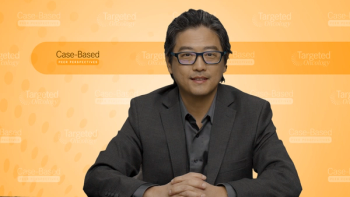The first patient has been administered CLN-978 as part of a first-in-human study of the drug in patients with relapsed or refractory B-cell non-Hodgkin lymphoma (B-NHL; NCT05879744).1
According to Cullinan Oncology, Inc, developer of CLN-978, the agent is a CD19/CD3 T-cell engaging antibody that may be an alternative to chimeric antigen receptor (CAR) T agents on the market. The agent has 2 single-chain variable fragments. One fragment binds to CD19 on malignant tumors, and the other to CD3 on T cells. It also has VHH, an antibody that allows for binding to human serum albumin. Together, these abilities enable T-cell activation and apoptosis of malignant tumors that express CD19.
“Despite recent advances in treating B-NHL, there remains significant unmet medical need, particularly among patients with relapsed/refractory disease,” said Jeffrey Jones, MD, MPH, MBA, chief medical officer, Cullinan Oncology, in a press release. “T cell engagers have shown clinical activity in this patient population, and CD19 is a well-validated target for B-cell malignancies. Based on preclinical evidence, we believe CLN-978 has a differentiated profile as it binds with very high affinity to CD19-expressing cells, even those with barely detectable levels of CD19. CLN-978 also offers patient-friendly administration and potentially reduced toxicity with an off-the-shelf treatment that is delivered subcutaneously. Collectively, these features may open up opportunities to investigate CLN-978 in additional CD19-mediated disease…”
About the Phase 1 Study of CLN-978
Trial Name: AA Phase 1, Open-label, Dose Escalation and Dose Expansion Study of CLN-978 in Patients With Relapsed/Refractory (R/R) B-cell Non-Hodgkin Lymphoma (B-NHL)
ClinicalTrials.gov Identifier: NCT05879744
Sponsor: Cullinan Oncology, LLC
Recruitment Contact: Timna Serino, 6174104650, clinops@cullinanoncology.com
Completion Date: November 2026
In the open-label, dose-escalation, dose-expansion study of CLN-978 in patients with relapsed or refractory NHL, an estimated 90 patients will be enrolled at 1 of 5 centers across the United States. Patients enrolled will be evaluated for the coprimary end points of safety and tolerability determined by the incidence and severity of adverse events (AEs), AEs of special interest, and serious AEs, as well as defining the dose regimen for CLN-978 by the occurrence of dose-limiting toxicities during the dose-escalation phase of the study.
The secondary end points to be assessed during the study include overall response rate, complete response rate, duration of response, area under the concentration time curve of CLN-978, half-life of CLN-978, and the incidence of anti-drug antibodies to CLN-978.
Patients with relapsed or refractory B-NHL are eligible to enroll in the study if they are 18 years of age or older with an ECOG performance score or 2 or lower. Patients are required to have a documented diagnosis of either diffuse large B-cell lymphoma, high-grade B-cell lymphoma, primary mediastinal large B-cell lymphoma, follicular lymphoma, mantle cell lymphoma, or marginal zone lymphoma.
All patients must also have relapsed, progressive, and/or refractory disease to enroll in the study, as well as measurable disease, and adequate laboratory values at the time of screening.
The study excludes patients with B-NHL who have primary central nervous system lymphoma, known, past, or current malignancy other than B-NHL, known clinically significant cardiac disease, significant central nervous system disease, confirmed autoimmune disorder that requires immune suppression currently or in the past, active Hepatitis C, B, or human immunodeficiency virus, or infections.
Individuals who were previously treated with live virus vaccines within 28 days of the start if CLN-978 are ineligible for the study. In addition, patients who have previously received allogeneic hematopoietic stem cell transplant (HSCT), autologous HSCT within 30 days of study treatment, CAR T cells within 30 days of study treatment, any investigational CD19- or CD3-directed therapy, and radio-conjugated or CD19 antibody within 12 weeks of CLN-978 dosing will be excluded from the study. Patients are also ineligible to enroll given receipt of investigational or standard-of-care monoclonal antibodies, chemotherapy, or investigational agents within 4 weeks or 5 half-lives of CLN-978 dosing, and if they received radiotherapy within 4 weeks of study dosing, excluding those who received treatment to control their symptoms. The criteria also states that women cannot be pregnant, and men will be excluded if they plan to procreate within 120 days of the last day of CLN-978 administration.
REFERENCES:
1. Cullinan Oncology announces first patient dosed in phase 1 trial evaluating CLN-978, a novel CD19xCD3 t cell engager, in relapsed/refractory B-cell non-hodgkin lymphoma. New release. Cullinan Oncology. August 9, 2023. Accessed August 9, 2023. https://tinyurl.com/3258vxa3
2. A study of CLN-978 in patients with relapsed or refractory (r/r) B cell non-hodgkin lymphoma (B-NHL). Updated June 1, 2023. Accessed August 9, 2023. https://tinyurl.com/3k247s8r




















